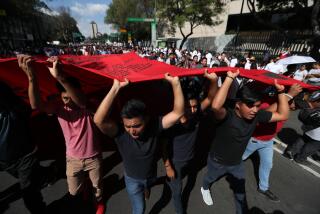Angry teachers take a break, but threats to Mexican reform remain
MEXICO CITY — Mexican President Enrique Peña Nieto has been busy telling the world about the economic miracle the country will experience after lawmakers approve the package of reforms he calls the Pact for Mexico.
Nobody said the reforms would come easily.
In recent weeks, hundreds of teachers who are opposed to the pact’s education component have taken to the streets in the southern state of Guerrero — many of them wearing masks to conceal their identities — blocking a major federal freeway, smashing windows with brickbats and setting fires.
The demonstrations, which began in earnest a few weeks ago, have illustrated the challenges Peña Nieto is likely to face as he seeks to shake up Mexico’s status quo, including the union culture that critics say has long been a drag on Mexico’s educational system. The pact includes proposed revisions of the telecommunications industry, the state-run oil company and the tax system, all of which have entrenched and powerful defenders.
On Friday, two days after some of the worst vandalism yet in Guerrero, Peña Nieto was granted a little temporary relief: In a TV interview, a union leader said his group would be taking a five-day hiatus from protesting, in order to engage in a dialogue with the government.
The union, the State Coordinating Committee of Guerrero Education Workers, opposes the education reform effort, including an amendment to the Mexican Constitution, approved in February, that will weaken the power of the teachers’ unions and subject educators to evaluations.
A bill containing the details of the reform must still be approved by Congress, and protests by other teachers unions have erupted in a few other states, including Michoacan and Oaxaca.
The Guerrero protests, with their images of masked men marching with pipes and bats at the ready, have dominated TV news for weeks, spreading fear that the government is losing control of the state.
The unions’ blockades of the toll road between Mexico City and the Guerrero resort town of Acapulco affected many Mexicans’ recent vacation plans. The union joined forces with other aggrieved parties, including a number of armed vigilante groups that have sprung up in Guerrero, ostensibly to protect citizens against the drug cartels.
On Wednesday, protesters in Chilpancingo, the Guerrero state capital, attacked offices of the major political parties with sticks and pipes, setting fire to the local headquarters of the president’s Institutional Revolutionary Party, or PRI.
Peña Nieto condemned the attacks Thursday. “For those Mexicans who want a different Mexico, who want to transform the current reality of our country, and make it a place with better opportunities for all, violence should in no way be the instrument for the transformation and attainment of that end,” he said.
The future of the Pact for Mexico was also threatened in a different way, when opposition lawmakers, angry about allegeations of a PRI vote-buying scheme in the state of Veracruz, pulled out of a Tuesday news conference to announce support for a planned overhaul of the financial sector.
Miguel Osorio Chong, Mexico’s interior minister, said in an interview Wednesday with Spain’s El Pais newspaper that the “crisis” over the pact had yet to be overcome because of continuing fallout from the vote-buying scandal. [Link in Spanish] On Thursday, Peña Nieto said that the major parties still seemed willing to continue discussing the reform plan.
On Friday, the Mexican Senate was busy fine-tuning the next major item in the pact: a telecommunications reform package that is expected to be approved next week. The proposed constitutional amendment, which seeks to stimulate competition in the cellphone and Internet markets, must then be approved by at least 17 of the 31 state legislatures.
Despite the hiatus called by teachers union, a student group allied with the union temporarily blocked the Mexico City-Acapulco highway for 40 minutes Friday, according to news reports.
ALSO:
Guatemala high court apparently restarts ex-dictator’s trial
Mexico authorities ready to retake occupied university rectory
Activists demand end to sex abuse of migrant children in southern Mexico
Cecilia Sanchez of The Times’ Mexico City Bureau contributed to this report.
More to Read
Sign up for Essential California
The most important California stories and recommendations in your inbox every morning.
You may occasionally receive promotional content from the Los Angeles Times.










